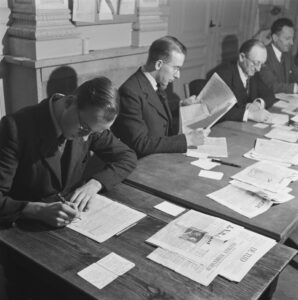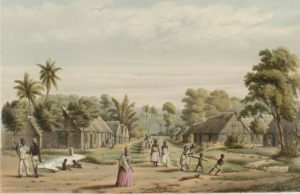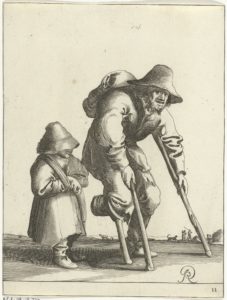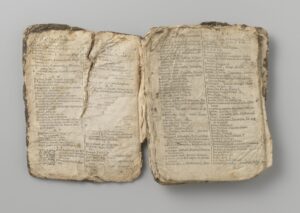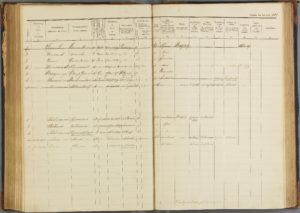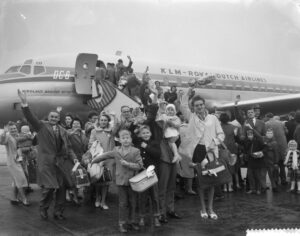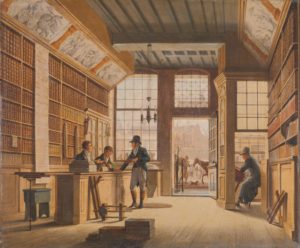A hinderwetvergunning is a nuisance permit. The hinderwet [nuisance law] dated from 1875 and set rules about business activities that could provide a nuisance, danger or harm to the environment and required that such businesses needed a permit. The law was replaced in 1993. Examples of businesses requiring a hinderwetvergunning are: Factories Gas stations Cattle farms Slaughterhouses Blacksmiths If your ancestors owned or worked for a business requiring … [Read more...]
About this website
Creating a website like this is a fun activity. There are so many options, so many choices. What do visitors want? What do I want? In this blog I will describe some of the things I encounter in developing and maintaining this website.
Dutch Genealogy News for November 2019
Here is an overview of the new sources, projects, and news about archives that were announced last month. Online sources About half the records from the Aldermen's Court of Tilburg and Goirle (1408-1811) are now available via the Regionaal Archief Tilburg. The Regionaal Archief Tilburg added several more charters to their charterbank. The majority of the charters from before 1550 are now available. THe records of the Sint-Catharinadal priory in Oosterhout (1271-1900) have been … [Read more...]
Quick tip – Use Geneal-IX to find Dutch records
The website Geneal-IX provides handy links organized per province and place to scans of records, including civil registration records, population registers, church records, and address books. These records may be available via FamilySearch or websites of archives. … [Read more...]
Quick tip – Trace enslaved people by their owners
If you are researching enslaved people in the former Dutch colonies like Suriname and the Netherlands Antilles, you need to trace their owners. Enslaved people created few records themselves, but their owners may have created records that mention them. Here are some examples of records created by owners that may include enslaved people: Last wills, disposing of slaves or stipulating their manumission Estate inventories, where slaves are included as property Notarial records … [Read more...]
Poor relief in the Netherlands in the 1600s
In the 1600s, poor relief was a local affair. There was no national social security system. Larger cities had poor masters who administered a fund to support the poor residents of the city. In the countryside and smaller cities, the deacons of the protestant church had the responsibility to aid people in need. Even people who did not belong to the church were supported. People who were unable to work because of illness, age, or disability received charity. The income of the poor relief … [Read more...]
Dutch Genealogy News for October 2019
Here is an overview of the new sources, projects, and news about archives that were announced last month. Online sources The Historisch Centrum Overijssel published indexes of birth records of several Overijssel towns: Oldemarkt, Kuinre, Hellendoorn, Oldenzaal, and Hengelo. The indexes can be found on Open Archieven. The slave registers of Suriname for 1830-1863 are online via the website of the National Archives. The period 1851-1863 was already online, but the early registers for … [Read more...]
Quick tip – Don’t rely on automatic translators
Automatic translators like Google Translate can be a big help if you don't speak Dutch. However, many older records use terms that no longer exist in modern Dutch, or that have shifted meaning. Automatic translators are also notoriously bad at translating words that may have multiple meanings. An example is the sentence: "Zijn neef was zijn getuige" which Google translates as "His cousin was his witness." However, the Dutch word "neef" can mean both cousin and nephew, which can make a big … [Read more...]
Quick tip – Use Past and Next Places in Population Registers
Population registers are a wonderful way to trace where our ancestors were living between 1850 and 1920. The registers give an overview of the people in the household. If someone moved into the household, the register should indicate the previous place of residence. If they moved within the municipality, the previous place will be indicated as their former address or the book and page number. If the person came from elsewhere, it will list the name of the municipality or … [Read more...]
Quick tip – Dutch Emigrants to Australia database
The National Archives has a database of Dutch emigrants to Australia between 1946 and 1991. The database may only be used for historical research. The database is compiled based on the card catalogs that were created by the Dutch consulates in Sydney, Melbourne, and Brisbane between 1946 and 1991. The cards were organized by heads of household and contain information about the whole family. Only the head of household is indexed. Contents of the database The database provides basic data … [Read more...]
Five places to find out-of-copyright books from the Netherlands
In the Netherlands, copyright expires 70 years after the author's death in most cases. Many books published in the early 1900s and earlier are in the public domain. Here are five places where you can find these publications. Delpher Delpher is a website by the Royal Library of the Netherlands where you can find books, newspapers, and magazines. Digitale Bibliotheek Nederlandse Letteren The Digitale Bibliotheek Nederlandse Letteren (Digital Library Dutch Written Works) contains many … [Read more...]


